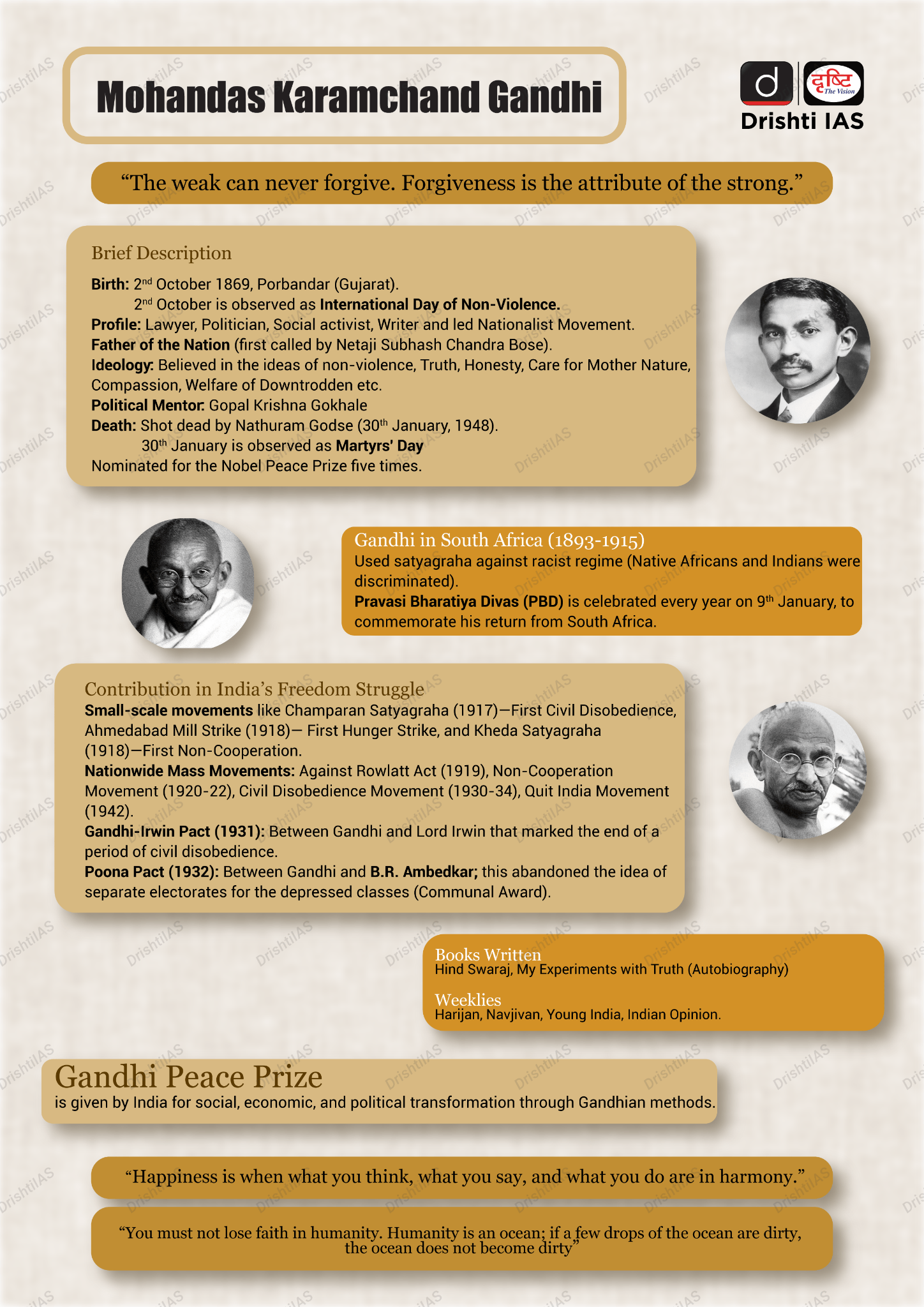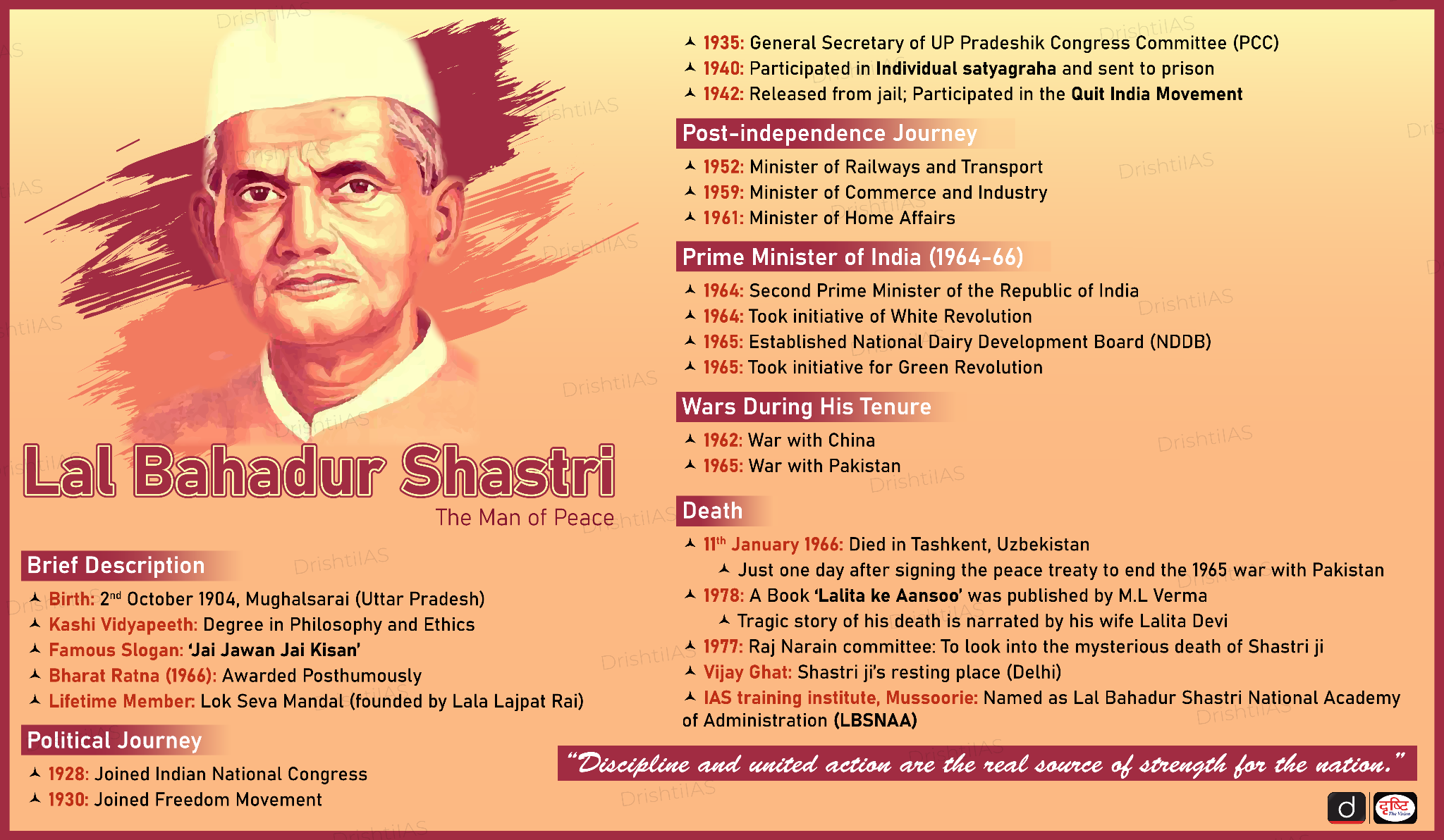Important Facts For Prelims
Birth Anniversary of Gandhi Ji and Shastri Ji
- 01 Oct 2024
- 6 min read
2nd October, every year is celebrated as the birth anniversary of Mahatma Gandhi and Lal Bahadur Shastri. Both of these leaders have played a monumental role in shaping our Nation.
What are the Key Facts About Mahatma Gandhi?
- Birth: 2nd October 1869 in Porbandar (Gujarat).
- Brief Profile: Lawyer, politician, social activist, and writer who became the leader of the nationalist movement against the British rule of India.
- Books Written: Hind Swaraj, My Experiments with Truth (Autobiography)
- Death: He was shot dead by Nathuram Godse on 30th January 1948.
- 30th January is observed as Martyrs' Day.
- Role in India’s Freedom Struggle
- Leadership of the Indian National Congress (INC): Mahatma Gandhi became a prominent leader of the INC in the early 20th century, advocating for non-violent resistance and mass mobilization to challenge British rule.
- The Belgaum session in 1924 was the only Congress session which was presided over by Gandhi Ji.
- Non-Cooperation Movement (NCM) (1920-1922): Gandhi launched the NCM in response to the Jallianwala Bagh massacre and the repressive Rowlatt Act.
- He urged Indians to boycott British institutions, goods, and honours, leading to widespread participation across the country.
- Gandhi Ji was awarded the Kaisar-i-Hind gold medal in 1915 for his service in the Boer War but returned it in 1920 to protest the Jallianwala Bagh massacre.
- Salt March (1930): Gandhi led the Salt March to the Gujarati coastal town of Dandi, protesting the British salt tax. This marked the beginning of the Civil Disobedience Movement.
- Quit India Movement (QIM) (1942): Gandhi called for the QIM, demanding an end to British rule in India.
- His slogan, "Do or Die," inspired millions to participate in protests, strikes, and acts of civil disobedience, marking a significant escalation in the freedom struggle.
- Philosophy of Non-Violence: Throughout his activism, Gandhi emphasized the principles of Satyagraha (truth force) and Ahimsa (non-violence), advocating for peaceful protests and moral integrity.
- His approach not only influenced the Indian independence movement but also inspired civil rights movements worldwide such as Nelson Mandela and Martin Luther King Jr.
- 2nd October is also observed as the International Day of Non-Violence, established by the United Nations General Assembly on 15th June 2007.
- Leadership of the Indian National Congress (INC): Mahatma Gandhi became a prominent leader of the INC in the early 20th century, advocating for non-violent resistance and mass mobilization to challenge British rule.
What are the Key Facts About Lal Bahadur Shastri?
- Birth: He was born on 2nd October 1904 in Mughalsarai, Uttar Pradesh.
- Brief Profile: He was the second Prime Minister of India, known for his leadership and his slogan "Jai Jawan Jai Kisan," emphasising the importance of both soldiers and farmers in nation-building.
- Death: He died on 11th January 1966, in Tashkent, Uzbekistan.
- He was the first person to be posthumously awarded the Bharat Ratna (1966).
- His Role in Nation Building:
- Leadership in the 1965 Indo-Pak War: Lal Bahadur Shastri effectively led India during the 1965 war, boosting national morale.
- Green Revolution: Shastri played a key role in promoting the Green Revolution, which helped India increase agricultural production and move towards self-sufficiency in food grains, addressing the nation’s food security challenges.
- National Integration: worked to foster national unity and integration by promoting harmony among diverse regions, languages, and cultures.
- While simultaneously encouraging policies of industrialization and self-reliance to strengthen India's economic growth and reduce dependence on foreign imports.
- Civil Services: Shastri emphasized the need for civil servants to maintain high ethical standards, transparency, and dedication, ensuring that the administration remained free from corruption and was committed to public service.
- Eg. He resigned as Rail Minister in 1952, taking moral responsibility for a rail accident that resulted in casualties.
UPSC Civil Services Examination, Previous Year Question (PYQ)
Q. With reference to the British colonial rule in India, consider the following statements: (2019)
1. Mahatma Gandhi was instrumental in the abolition of the system of ‘indentured labour’.
2. In Lord Chelmsford’s ‘War Conference’, Mahatma Gandhi did not support the resolution on
recruiting Indians for World War.
3. Consequent upon the breaking of Salt Law by Indian people, the Indian National Congress was declared illegal by the colonial rulers.
Which of the statements given above are correct?
(a) 1 and 2 only
(b) 1 and 3 only
(c) 2 and 3 only
(d) 1, 2 and 3
Ans: (b)
Q. Who among the following translated the Autobiography of Madam Curie in Hindi? (2008)
(a) Atal Bihari Vajpayee
(b) Lal Bahadur Shastri
(c) Choudhary Charan Singh
(d) Gobind Vallabh Pant
Ans: (b)






